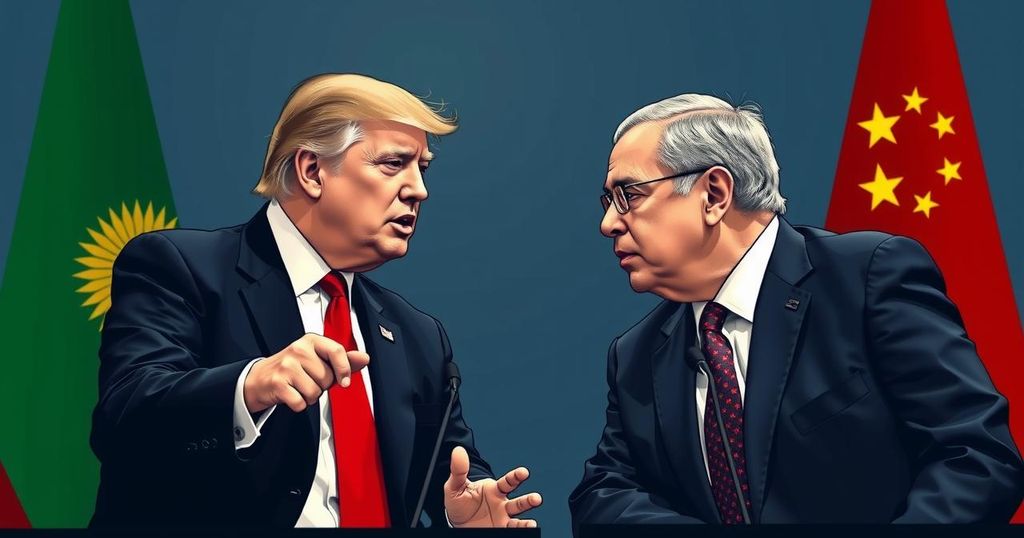Trump’s Tariff Threat Against BRICS Nations: Implications for Global Currency Dynamics
President-elect Donald Trump threatened a 100% tariff on BRICS nations if they pursue an alternative to the U.S. dollar. The BRICS countries, formed to bolster emerging economies, aim to decrease dollar dependency due to its geopolitical advantages. Experts view the establishment of a competing currency as implausible due to the dollar’s dominance. If tariffs are imposed, U.S. consumer prices could rise significantly. Critics argue that Trump’s threats may undermine the dollar’s standing.
On November 30, President-elect Donald Trump threatened to impose a staggering 100% tariff on nine nations collectively known as the BRICS, should they attempt to establish an alternative to the U.S. dollar. This coalition, comprising Brazil, Russia, India, China, South Africa, Egypt, Ethiopia, Iran, and the United Arab Emirates, aims to reduce their reliance on the dollar, which dominates global trade. Trump emphasized the need for these countries to commit to not creating or supporting a competing currency, asserting that failure to do so would jeopardize their access to the U.S. market.
The formation of BRICS in 2009 was intended to bolster the economic clout of emerging nations while mitigating their dependence on the U.S. dollar. The dollar’s current status as the primary global reserve currency affords the U.S. significant economic benefits and geopolitical leverage. Recent endorsements from leaders such as President Putin of Russia call for alternatives due to the perceived weaponization of the dollar in international transactions. Despite these discussions, experts regard the establishment of a BRICS currency as unlikely in the near term, largely due to the dollar’s entrenched dominance and the relative instability of the BRICS economies.
While a 100% tariff on goods from BRICS countries appears improbable, if enacted, it would likely inflate consumer prices in the U.S. and could adversely impact the country’s economic landscape. Economists warn that the imposition of such tariffs would not only elevate product costs but could also inadvertently provide justification for other nations to shift away from using the dollar, thereby undermining its global standing. Criticism has arisen, noting that Trump’s threats may project U.S. weakness and a lack of confidence in the dollar’s enduring value.
The BRICS nations have increasingly sought to establish an alternative economic framework that diminishes their reliance on the U.S. dollar in international trade. Formed in 2009, the group advocates for the interests of emerging economies and aims to enhance their sovereignty in global commerce. The dollar’s predominate role as the primary reserve currency offers the U.S. significant advantages, including lower borrowing costs and extensive geopolitical influence. As a consequence of recent geopolitical tensions and economic policies, the leaders of several BRICS countries have begun to propose the concept of creating a uniform alternative currency to increase their collective bargaining power and mitigate dollar dependence.
In summary, President Trump’s potential imposition of 100% tariffs on BRICS nations is a response to their aspirations for an alternative currency to the U.S. dollar. While the BRICS coalition aims to decrease reliance on the dollar, economic experts suggest that such a currency is unlikely to materialize soon due to the dollar’s entrenched global position. The threat of tariffs raises concerns regarding increased consumer prices and may inadvertently prompt other nations to reconsider their use of the dollar, thus weakening the dollar’s status in international trade.
Original Source: www.cbsnews.com




Post Comment